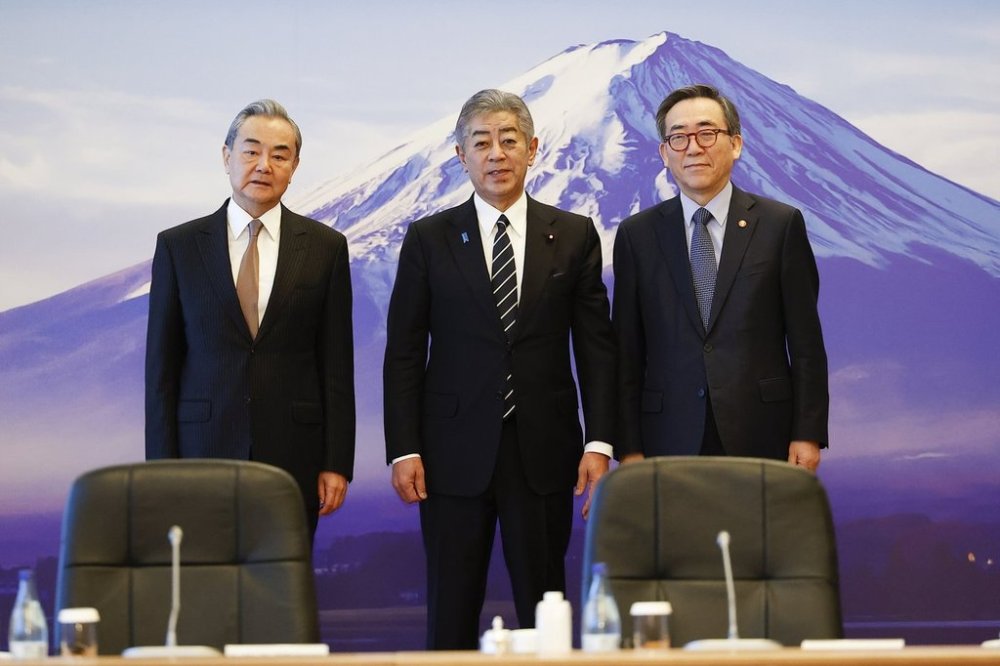Japan, China and South Korea discuss trilateral cooperation
Advertisement
Read this article for free:
or
Already have an account? Log in here »
To continue reading, please subscribe:
Monthly Digital Subscription
$0 for the first 4 weeks*
- Enjoy unlimited reading on winnipegfreepress.com
- Read the E-Edition, our digital replica newspaper
- Access News Break, our award-winning app
- Play interactive puzzles
*No charge for 4 weeks then price increases to the regular rate of $19.00 plus GST every four weeks. Offer available to new and qualified returning subscribers only. Cancel any time.
Monthly Digital Subscription
$4.75/week*
- Enjoy unlimited reading on winnipegfreepress.com
- Read the E-Edition, our digital replica newspaper
- Access News Break, our award-winning app
- Play interactive puzzles
*Billed as $19 plus GST every four weeks. Cancel any time.
To continue reading, please subscribe:
Add Free Press access to your Brandon Sun subscription for only an additional
$1 for the first 4 weeks*
*Your next subscription payment will increase by $1.00 and you will be charged $16.99 plus GST for four weeks. After four weeks, your payment will increase to $23.99 plus GST every four weeks.
Read unlimited articles for free today:
or
Already have an account? Log in here »
Hey there, time traveller!
This article was published 21/03/2025 (280 days ago), so information in it may no longer be current.
TOKYO (AP) — Foreign ministers from Japan, China and South Korea sought trilateral cooperation on common ground in areas like aging, declining births, natural disasters and the green economy at a meeting that took place at a time of growing tensions.
At a joint news conference after the talks, Japanese Foreign Minister Takeshi Iwaya said he, his Chinese counterpart Wang Yi and South Korea’s Cho Tae-yul agreed to promote mutual understanding and trust, while tackling shared and multi-generational concerns to gain wider support for trilateral cooperation.
Iwaya emphasized his concerns about North Korea’ s nuclear and missile development and cooperation with Russia as threats, and stressed the need to pursue the North’s full denuclearization under the U.N. Security Council resolutions.

Iwaya reiterated Japan’s condemnation of Russia’s war on Ukraine. He said there is no place in the world for unilateral attempts to change the status quo by force, a subtle message about China’s growing assertiveness in the region.
Wang said China supports the formation of a mutual regional economy and proposed resuming talks on an economic framework for the three countries and promoting an expansion of the 15-nation Regional Comprehensive Economic Partnership, or RCEP.
Wang said trilateral cooperation in areas including technology and climate exchange will “serve as key driving force for East Asian cooperation.”
Saturday’s meeting focused on plans for a trilateral leaders’ summit later this year amid growing political and economic uncertainty at home and challenges from U.S. President Donald Trump.
The three-way meetings are an accomplishment for Japan, which has historical and territorial disputes with both China and South Korea. Iwaya said he will accelerate efforts toward achieving a leaders’ summit in Japan later this year.
Separately, delegations from Japan and China later Saturday held their first high-level economic dialogue since April 2019, attended by dozens of officials from finance, economy, transportation, environment, health and labor ministries.
Expanding cooperation into new areas and strengthening of communication are key to promoting comprehensive and mutually strategic relations between Japan and China, Wang said.
But the global economy now faces serious changes, with unilateralism and protectionism accelerating and politicizing of science and technology, as well as expansion of national security have become rampant, Wang said in an apparent criticisms to Trump.
Iwaya later told reporters that Japan and China acknowledged progress in their mutually agreed process toward a lifting of China’s ban on Japanese seafood imports. Beijing has banned Japanese seafood since the August 2023 start of discharges of treated radioactive wastewater into the sea from the tsunami-hit Fukushima Daiichi nuclear power plant.
Iwaya and Cho separately met and reaffirmed their commitment to maintain communication to resolve bilateral issues, cooperating for North Korea’s complete denuclearization and strengthening three-way cooperation with the United States amid growing global uncertainties, South Korea’s Foreign Ministry said.
Tokyo and Beijing agreed in December to improve ties in spite of their differences, including disputes over their territorial row in the East China Sea and wartime history.
___
Associated Press writers Kanis Leung in Hong Kong and Kim Tong-hyung in Seoul, South Korea, contributed to this report.

